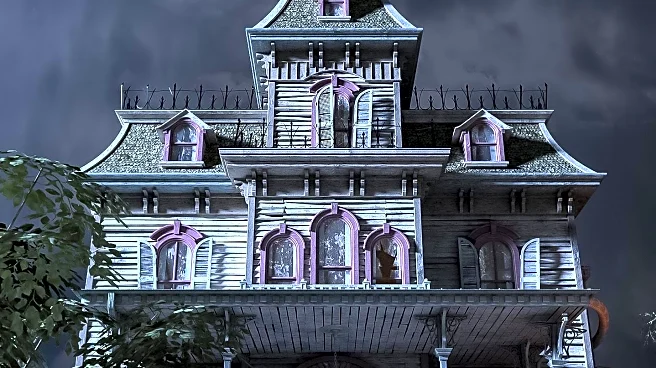What's Happening?
Across the United States, travelers are increasingly drawn to hotels with haunted histories, seeking unique experiences over conventional stays. These hotels, which once housed inmates, soldiers, and cult members, have transformed their grim pasts into
glamorous destinations. They now host events such as weddings and wellness retreats, while offering paranormal tours and repurposed spaces that appeal to ghost hunters and history enthusiasts alike. Notable locations include the Algonquin Hotel in New York, known for its Jazz Age gatherings and reported ghostly encounters, and the Crescent Hotel and Spa in Arkansas, infamous for its fraudulent cancer hospital past. Other sites like the Liberty Hotel in Boston, formerly a jail, and the Lodge at Marconi in California, once a cult site, have been converted into luxury accommodations, preserving their historical elements.
Why It's Important?
The trend of visiting haunted hotels reflects a broader shift in consumer preferences towards experiential travel. This interest in the paranormal and historical intrigue offers economic benefits to the hospitality industry, as these unique properties attract tourists seeking memorable stays. The revival and repurposing of these sites also contribute to preserving historical architecture and stories, providing educational opportunities about America's past. Additionally, the popularity of such destinations can boost local economies through increased tourism, benefiting nearby businesses and communities. However, it also raises questions about the commercialization of tragic histories and the ethical implications of profiting from past misfortunes.
What's Next?
As interest in haunted hotels continues to grow, more properties may seek to capitalize on their eerie histories by offering themed experiences and events. This could lead to further investments in renovations and marketing strategies aimed at attracting niche tourism markets. Stakeholders, including local governments and historical preservation societies, may engage in discussions about balancing commercial interests with the respectful treatment of historical sites. Additionally, the trend could inspire new cultural and media content, such as documentaries and books, exploring the stories behind these haunted locations.
Beyond the Headlines
The fascination with haunted hotels taps into deeper cultural and psychological dimensions, reflecting society's enduring interest in the supernatural and the unknown. It highlights how narratives of fear and mystery can be transformed into entertainment and leisure activities. This phenomenon also underscores the role of storytelling in tourism, where the allure of a place is often enhanced by its historical and mythical associations. As these sites gain popularity, they may influence broader cultural perceptions of history and the supernatural, potentially shaping future tourism trends and consumer behaviors.















